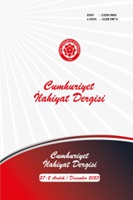Âhiret Hayatının Gerekliliği Bağlamında İmam Mâtürîdî’nin Deizm Eleştirisi
Imam Māturīdī’s Criticism of Deism in The Context of The Necessity of The Hereafter
Author(s): Hasan GümüşoğluSubject(s): Middle-East Philosophy, Philosophy of Religion, History of Islam, Sociology of Religion, History of Religion
Published by: Cumhuriyet Üniversitesi İlahyat Fakültesi
Keywords: Faith; Kalam; Māturīdī; Deism; The Hereafter; Prophethood;
Summary/Abstract: Deism, which is known for denying the belief in prophethood and the hereafter while accepting the existence of a deity who is understood through reason but does not interfere with the universe while, has gained increasing popularity especially in positive scientific circles in Europe with the Enlightenment period. The development of deism in Europe has been significantly influenced by the ideas of philosophers and scientists such as Descartes, Newton, Voltaire, David Hume, and Kant. Although there is no word in Islamic terminology that corresponds with the meaning of deism, terms such as Dahriyya, Barāhima, ilhad and heresy have been used to refer to different types of denial, including deism and atheism. However, it can be said that “Dahriyyah” is closer to atheism in meaning, while “Barāhima” is used in a more specific sense to deny prophethood. The words “ilhad” and heresy are used to express any kind of denial that rejects the principles of Islam. Parallel to deism being a subject of interest in our country and around the world, there has been a significant increase in studies conducted both in favour and against it. In this article, the rational proofs mentioned by Māturīdī regarding the existence of the hereafter, which deism rejects, have been discussed. In particular, the evidence found in the exegesis of relevant verses of the Qur’ān in Kitab al-Ta’wilat have been subject to examination. Māturīdī has emphasized the importance of providing rational proof for those who do not believe in the Qur’ān, stating that they will not accept any evidence derived from it. Māturīdī, who researched the reasons why people deny the afterlife, explained that people’s attempt to understand everything by comparing them to their own abilities is an important reason for the denial of the afterlife. According to him, people deny the afterlife because they believe that the power to resurrect the dead is beyond their own abilities and assume that their power is not enough for such an act. If they had contemplated the creation of the heavens and the earth, they would have realised that Allāh’s power is different from the power of His creatures. Furthermore, Imam Māturīdī pointed out that it would be absurd and pointless for Allāh, the Creator of the universe, to have created it solely for the purpose of its destruction. He emphasised that there must be a purpose for its creation, and that this purpose indicates the existence of the afterlife, where the actions of the created beings will be accounted for. In addition, Māturīdī, who said “If the world was eternal, it would not be possible to repay the deeds done,” emphasised the necessity of distinguishing between virtuous and evil individuals and giving everyone the reward or punishment they deserve. He acknowledged that human beings live in this world as a test, and the true consequences of their actions will be revealed in the hereafter.
Journal: Cumhuriyet İlahiyat Dergisi
- Issue Year: 27/2023
- Issue No: 2
- Page Range: 329-348
- Page Count: 20
- Language: Turkish

